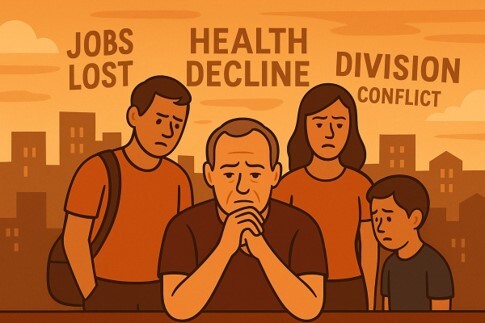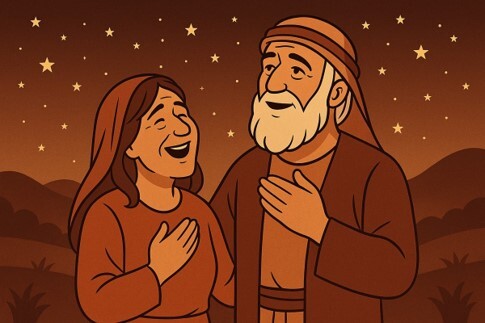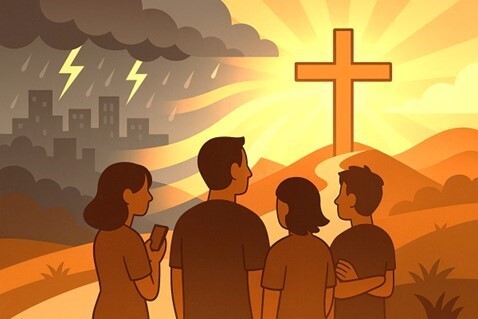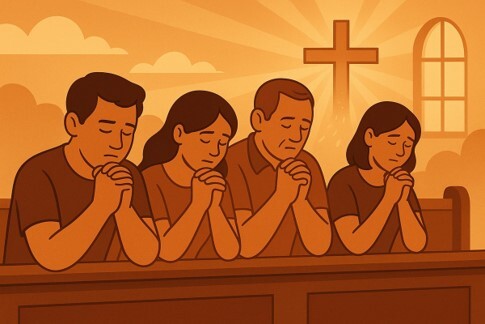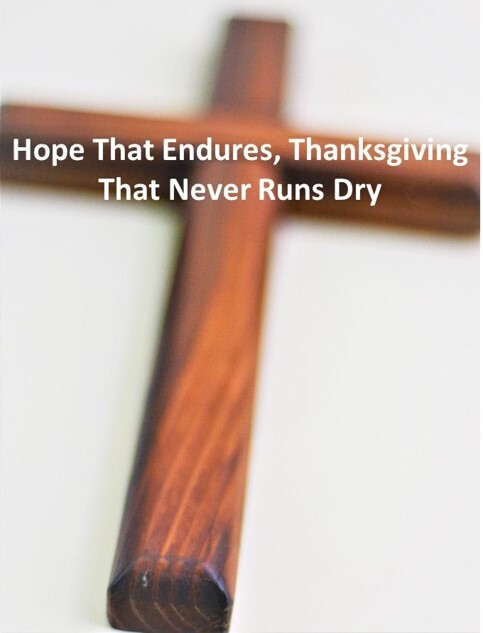Greetings in the name of the Father, the son, and the Holy Spirit.
“May the God of hope fill you with all joy and peace as you trust in Him, so that you may overflow with hope by the power of the Holy Spirit.” – Romans 15:13
It’s been a hard season for many. Some have lost jobs they thought were secure. Others have watched their health decline or seen loved ones suffer. The headlines tell stories of division, conflict, and frustration. Even in our communities, people no longer seem to agree on what’s right. Each person speaks of truth, but few seek the One who is truth.
We often hear the phrase, “Let’s agree to disagree.” But when every standard shifts, when everyone does what seems right in their own eyes, unity cannot stand. Sometimes we can see through the confusion — people claim to protect the community’s good, but often it’s self-interest in disguise. And the most heartbreaking part? Even what is truly godly is framed as someone’s personal agenda, condemned in the name of unity.
So where do we find hope in a world like this? How can we still give thanks when the foundation beneath us feels like sand?
The answer is found not in circumstances, but in the character of God.
Hope that endures is not built on what we can control — but on the One who never changes.
Today, we’ll explore three truths that show us how hope and thanksgiving are not just feelings for good times, but lifelines for difficult ones.
1: Hope Beyond What We See
When everything feels uncertain, God’s promises invite us to trust beyond sight. Hope is not denial of reality; it is defiance of despair. It’s choosing to believe that God is still faithful even when nothing else makes sense.
Think of Abraham and Sarah. God told them they would have a son, even though Abraham was nearly one hundred years old and Sarah was ninety. They had waited twenty-five long years for that promise. They had heard the words, seen the stars, and even received new names — Abram became Abraham, “father of many nations.” Yet year after year passed with no sign of fulfillment.
At one point, Sarah even laughed when the angel of the Lord repeated the promise (Genesis 18:12). Who could blame her? It was human laughter — half disbelief, half heartbreak. But God turned that laughter of doubt into laughter of joy. The following year, Sarah gave birth to Isaac, and they named him “laughter,” as a living reminder that God’s timing is always perfect — never late, never early, but always right on time.
That’s what hope does — it looks past what seems impossible and holds on to what God has spoken.
The writer of Hebrews tells us,
“Faith is the substance of things hoped for, the evidence of things not seen.” (Hebrews 11:1)
And again,
“After waiting patiently, Abraham received what was promised.” (Hebrews 6:15)
Our modern world loves proof. We want data, evidence, guarantees, and outcomes we can measure. But the most meaningful things in life — love, faith, and hope — are built not on control, but on trust. Abraham’s story isn’t about blind faith; it’s about tested faith — belief refined through waiting, wandering, and wondering. He didn’t trust in himself; he trusted in the God who cannot lie.
Romans 4 reminds us,
“Against all hope, Abraham in hope believed … being fully persuaded that God had power to do what He had promised.” (Romans 4:18, 21)
In every generation, there comes a point when hope seems lost — when peace feels out of reach, when reconciliation appears impossible. Look at our world today: conflict in Gaza, war in Ukraine, division in homes and governments. To human eyes, peace feels like a dream fading into the distance. Yet the same God who brought life to Sarah’s barren womb can bring peace to hearts hardened by generations of pain.
Even in our own nation, we’ve seen glimpses of this quiet hope. Think of times when bitterly divided leaders finally came together — moments when government gridlock ended, not because of human wisdom, but because mercy found a way through pride. Those moments remind us that God is still able to turn hearts and guide nations when His people pray.
Hope is seeing God’s hand at work when the evidence is hidden. It’s trusting that what feels delayed is not denied. And when hope holds, thanksgiving soon follows — because we realize that even in the waiting, God has never let go.
2: Hope That Heals What’s Broken
We live in an age of deep frustration. The more connected we become, the more divided we feel. Screens glow in every hand, yet hearts grow lonelier by the day. People speak louder but listen less. We build platforms and followers, but somewhere along the way, we lose compassion. Even within communities that bear God’s name, conflict often takes center stage. We are quick to defend our positions, but slow to love our neighbors.
When storms rage, people instinctively turn inward. Fear shrinks the heart. But hope — true hope — expands it. Hope in Christ doesn’t make us blind to pain; it opens our eyes wider to grace. It helps us see that behind every disagreement and disappointment, God is still weaving redemption.
Jesus knew this world of brokenness. He entered it fully. He walked among betrayal, injustice, and misunderstanding. He knew what it meant to be rejected by His own. Yet through it all, He brought peace to those who least deserved it.
Isaiah 53:5 declares,
“He was pierced for our transgressions, He was crushed for our iniquities; the punishment that brought us peace was on Him, and by His wounds we are healed.”
At the cross, God did what seemed impossible. He reconciled heaven and earth — not through power or politics, but through love. In Jesus, God built a bridge between Himself and humanity, and between us and one another. That’s why Ephesians 2:14 reminds us:
“He Himself is our peace, who has made the two groups one and has destroyed the barrier, the dividing wall of hostility.”
Where sin built walls, Christ builds bridges. Where anger shouts, His mercy whispers, “Peace, be still” (Mark 4:39).
When the world calls righteousness arrogance and condemns truth in the name of tolerance, Jesus shows the better way — mercy with conviction, grace with truth. He did not compromise truth to keep peace, nor did He abandon mercy to prove rightness. He embodied both.
Reconciliation sometimes feels as impossible as Abraham’s promise. Yet at the cross, when sin destroyed the relationship between God and humanity, Jesus became the mediator. He absorbed the storm so we could have peace. That’s why Paul writes,
“For there is one God and one mediator between God and mankind, the man Christ Jesus.” (1 Timothy 2:5)
Every time we forgive instead of retaliate, every time we pray instead of argue, every time we choose love instead of bitterness — hope wins another quiet victory in this world.
Hope heals in small, often unseen ways. A gentle word that softens anger. A prayer spoken through tears. A hand extended toward someone who hurt you. These are not small acts in God’s eyes; they are seeds of redemption.
Romans 12:21 reminds us,
“Do not be overcome by evil, but overcome evil with good.”
Even the smallest act of hope pushes back the darkness. And when hope heals, thanksgiving blooms — because we see that the God who once reconciled the world to Himself is still healing hearts today.
3: Thanksgiving That Grows Out of Hope
Thanksgiving is more than a holiday; it’s a posture of the heart that flows from hope. It is not an event marked by a meal or a season—it’s a way of seeing the world through the lens of God’s mercy.
Most of us naturally give thanks when life goes well—when the prayer is answered, when the promotion finally comes, when healing restores what was lost. But the deepest kind of thanksgiving doesn’t wait for perfect conditions; it rises in the middle of the storm.
The Apostle Paul wrote,
“Rejoice always, pray continually, give thanks in all circumstances; for this is God’s will for you in Christ Jesus.” (1 Thessalonians 5:16–18)
Notice the words “in all circumstances.” He didn’t say for all circumstances, because not everything that happens to us is good—but we can give thanks in them, because God’s presence and purpose never leave us.
A few weeks ago, one of my church family members had an accident. He was drilling and accidentally pierced his finger. It could have been disastrous. When the X-ray came back, the doctor pointed out something remarkable: the drill bit had missed the bone by the thinnest margin—just a hair’s width. You could see the tiny gap on the screen. We all looked at it and knew—this was not luck. It was mercy.
We gathered and prayed, not just for healing, but in gratitude. Not because everything was perfect, but because we had seen His protection, felt His hand of grace in what could have been tragedy.
That is the essence of thanksgiving. It is not rooted in what we have achieved but in what God has already done. It’s not the applause after victory—it’s the quiet whisper of gratitude that rises even when life hurts.
True thanksgiving grows from hope, because hope reminds us that our story isn’t finished yet. Hope says, “God is still writing.” And every moment we trust Him, even when we don’t understand, is a testimony of faith.
One morning during prayer, a brother said something simple yet profound:
“It’s true that our hope is closer day by day—even today.”
Those words sank deep. Every sunrise is another step closer to the fulfillment of God’s promises. Every breath we take is grace renewed. Every act of trust is proof that God is still working.
As the Thanksgiving season arrives, some may feel there’s little to celebrate. The economy is uncertain, families are divided, and peace feels far away. Yet thanksgiving has never depended on what we have—it depends on who God is.
David wrote,
“I will bless the Lord at all times; His praise shall continually be in my mouth.” (Psalm 34:1)
Thanksgiving begins when we remember that everything good—our breath, our families, our faith, our very salvation—is a gift.
And even when things don’t go as we planned, gratitude becomes an act of rebellion against despair. It’s declaring, “I trust You, Lord, even here.”
The prophet Jeremiah, weeping over a ruined Jerusalem, still found this truth:
“The steadfast love of the Lord never ceases; His mercies never come to an end; they are new every morning; great is Your faithfulness.” (Lamentations 3:22–23)
Even now, in a world marked by tension and pride, God’s light still breaks through the clouds. His mercy still finds us. And the miracle is this—we can thank Him now—before the breakthrough, before the healing—because His faithfulness has never failed.
Thanksgiving, then, is more than a day. It’s a rhythm of hope—a way of living that remembers God’s goodness, trusts His promises, and sees every moment as another reason to say, “Thank You, Lord.”
Summary: Hope That Endures, Thanksgiving That Overflows
When everything feels unsteady — when jobs are lost, when health fades, when hearts are divided — God still whispers the same invitation: “Be still, and know that I am God.” (Psalm 46:10) He calls us not to deny the storm, but to anchor in Him through it.
The world may dismiss this as naïve optimism, but it is far more than that. It is faith — the quiet, unshakable confidence that the same God who kept His promise to Abraham, who raised Jesus from the grave, who calmed the raging sea and healed the brokenhearted, will keep His promises still.
That is why thanksgiving is possible even before the storm ends, and why hope survives even when the waiting feels long. We do not give thanks because everything is well; we give thanks because we trust the One who makes all things new and well in His time.
When we look back, we can trace His fingerprints — in narrow escapes, in small mercies, in moments of peace we didn’t understand. When we look ahead, we see His promises — still shining like stars over Abraham’s tent, still reminding us that nothing is too hard for God.
Hope in Jesus is not wishful thinking; it is the anchor of the soul, steady and sure. And when our hearts are anchored in Him, thanksgiving flows naturally — not as a duty, but as delight. Even the act of giving thanks becomes a quiet miracle of faith.
“Rejoice always, pray continually, give thanks in all circumstances; for this is God’s will for you in Christ Jesus.” (1 Thessalonians 5:16–18)
So as we gather this season — in homes, at tables, and in quiet moments of prayer — let us remember:
We give thanks not because life is perfect, but because God is faithful.
Let’s pray together.
Lord, when the world shakes and our hearts grow weary, remind us of Your unchanging love.
Teach us to hope like Abraham — to trust when we cannot see, to believe when we cannot understand.
Heal our divisions, O God. Turn our frustration into faith, our fear into compassion.
As You calmed the storm and reopened what seemed impossible, bring peace to our communities, to nations in conflict, and to hearts that have grown cold.
We thank You for Your protection, Your mercy, and the quiet miracles that fill our days — even the ones we barely notice.
This Thanksgiving, anchor our hearts not in what we have, but in who You are.
For You are our rock, our refuge, and our hope — now and forever.
In Jesus’ name, Amen.
“Let the peace of Christ rule in your hearts, since as members of one body you were called to peace. And be thankful.
Let the message of Christ dwell among you richly…
And whatever you do, whether in word or deed, do it all in the name of the Lord Jesus, giving thanks to God the Father through Him.” – Colossians 3:15–17

